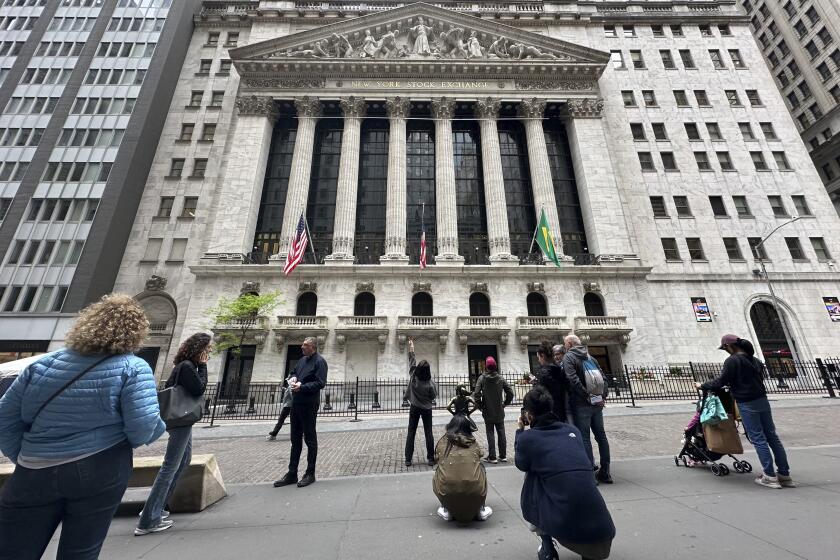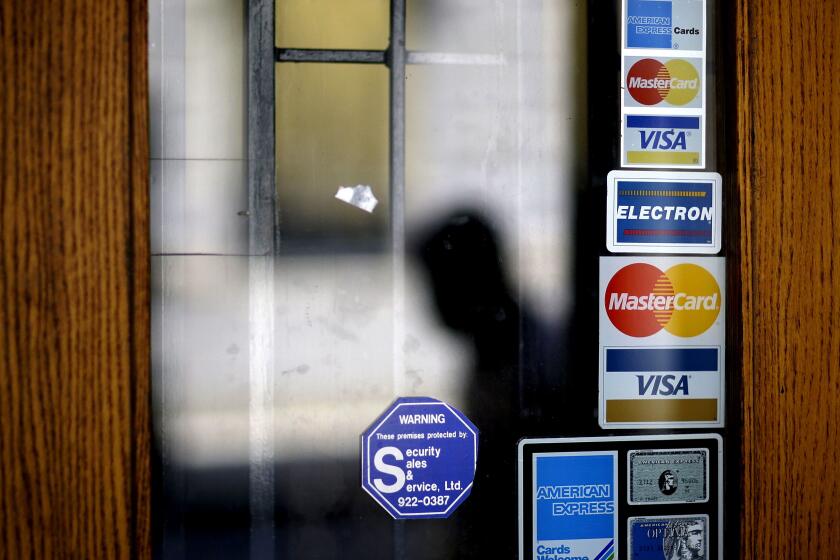Gambling on Casino Stocks Could Pay Off
Casino stocks suffered a second day of heavy selling Tuesday as some investors decided that the game of speculating on speculators had reached its upper limits.
But don’t count these stocks out for long, some Wall Streeters say. Because legalized gaming continues to spread nationwide, this is hardly a fading industry. The only question is how much you should pay for these stocks--and which will be the survivors.
The selloff of the last two days wasn’t sparked by any fundamental change in the business, gaming analysts say. Indeed, the casino firm with one of this year’s hottest stocks--Casino Magic Corp. of Bay St. Louis, Miss.--opened its second Mississippi Gulf Coast gaming facility last weekend, off Biloxi, to what it called rave reviews.
But when profit taking began in these stocks and other recent high flyers Monday, it quickly snowballed. Casino Magic shares, which had rocketed from $18 earlier this year to a recent peak of $85 on NASDAQ, plunged $8 on Monday and another $6.625 on Tuesday, to close at $63.875.
There’s no question that gaming stocks have become a bona fide mania on Wall Street this year, but all manias are based on reasoned optimism, at least initially. As cash-strapped local governments have turned to legalized gaming as a new source of tax revenue, proposals for new casinos have sprung up across the country. Gaming & Wagering Business magazine in New York says 20 states have approved casinos in one form or another (often on Indian reservations).
Most of the excitement, however, has been focused on Mississippi riverboat gambling, as states from Illinois down to Louisiana have OKd boat gambling in either moving or stationary (dockside) ships.
The sharp rise of riverboat gaming stocks such as Casino Magic, Presidential Riverboat, Promus Cos. (which owns Harrah’s) and Hollywood Casinos hasn’t been built on thin air. Riverboat gaming has in fact already been shown to be exceedingly profitable, despite its lowbrow, low-roller image.
Casino Magic, for example, earned $13.49 million, or $1.36 a share, in the quarter ended March 31, on revenue of just $38.72 million. Those results were produced solely by the firm’s first two casinos, in Bay St. Louis and Deadwood, S.D.
Marvin Roffmann, a Philadelphia money manager who has long followed the gaming companies, says that with the exception of Iowa’s experiment with riverboat gambling (where the state imposed loss-limits on patrons), the results overall have been spectacular. “These aren’t just fads,” he says of heartland gaming ventures.
Indeed, the operating profit margins for Casino Magic and other riverboat players are in the 40% to 50% range, Roffmann says--numbers the gaming industry hasn’t seen since the early days of Atlantic City, in the 1970s.
But that also is what has begun to worry Wall Street, Roffmann figures: As with Resorts International and other early Atlantic City casinos, the first players in the riverboat market will make plenty of money--until competition grows. And of course, it is now growing by leaps and bounds.
“Emerging markets can and do mature quickly,” notes Steven Eisenberg, analyst at Oppenheimer & Co. in New York. Thus, he says the casino stocks may be entering a new phase of what he still terms a bull move. Instead of wild speculation that lifts all players, he thinks Wall Street will begin to get much more selective--trying to pick out the companies that are likely to survive and prosper in the long run, even as competition balloons.
The safest long-term bets on gaming’s growth, Eisenberg says, are the same names you would have heard a year ago: the large, well-capitalized companies such as Circus Circus, Caesars World and Mirage Resorts. All three, he notes, are in the process of levering their Las Vegas experience (and capital) in new gambling ventures nationwide, from Indian reservations to mega-developments in New Orleans and Chicago.
Another idea, Eisenberg says, is Boomtown Inc. (which Oppenheimer brought public last year). A Nevada casino operator for 30 years, Boomtown operates an Old West-themed casino near Reno, and now is taking that theme to a new facility near Biloxi. But instead of going after the volatile tourist trade, Boomtown plans to play to locals, a conservative strategy that has worked well in Nevada, Eisenberg says.
What about the rest of the up-and-coming riverboat gaming companies? If fat profits keep rolling in for another year or so as competition ramps up, chances are these stocks haven’t seen their last rally. But with their share prices already at high levels relative to expected earnings, it’s probably late in the blackjack game for many of these smaller players. They may be interesting speculations--but it’s dangerous to think of most of them as long-term investments.
The Chips Are Down Gaming stocks, which had been the market’s stars this spring, have plunged in recent days. A look at some of the stocks and their price-to-earnings ratios, based on this year’s estimated earnings.
52-week Tues. ’93 Stock (market) high/low close P-E Boomtown Inc. (O) 32 1/2-10 1/8 26 1/4, -3 1/4 27 Caesars World (N) 50 7/8-25 45 1/2, -1 1/2 14 Casino Magic (O) 85-8 7/8 63 7/8, -6 5/8 16 Circus Circus (N) 62 1/4-38 5/8 55 7/8, - 5/8 22 Grand Casinos (O) 52-10 3/8 37 3/4, -6 90 Hollywood Casino (O) 32 3/4-17 1/2 23 1/8, - 7/8 NA Mirage Resorts (N) 47 3/8-22 41 5/8, -2 7/8 21 MGM Grand (N) 37 1/4-12 1/8 30 7/8, -3 3/4 (loss) Pres. Riverboat (O) 49 3/4-10 7/8 39 3/4, -3 1/8 58 Promus Cos. (N) 48 3/4-13 39 1/4, -3 3/4 34 Station Casino (O) 24 1/2-17 3/4 17, -2 1/2 NA
Market: N--NYSE; O-NASDAQ
P-Es based on analysts’ consensus estimates, compiled by Zacks Investment Research. NA: No estimate available.






